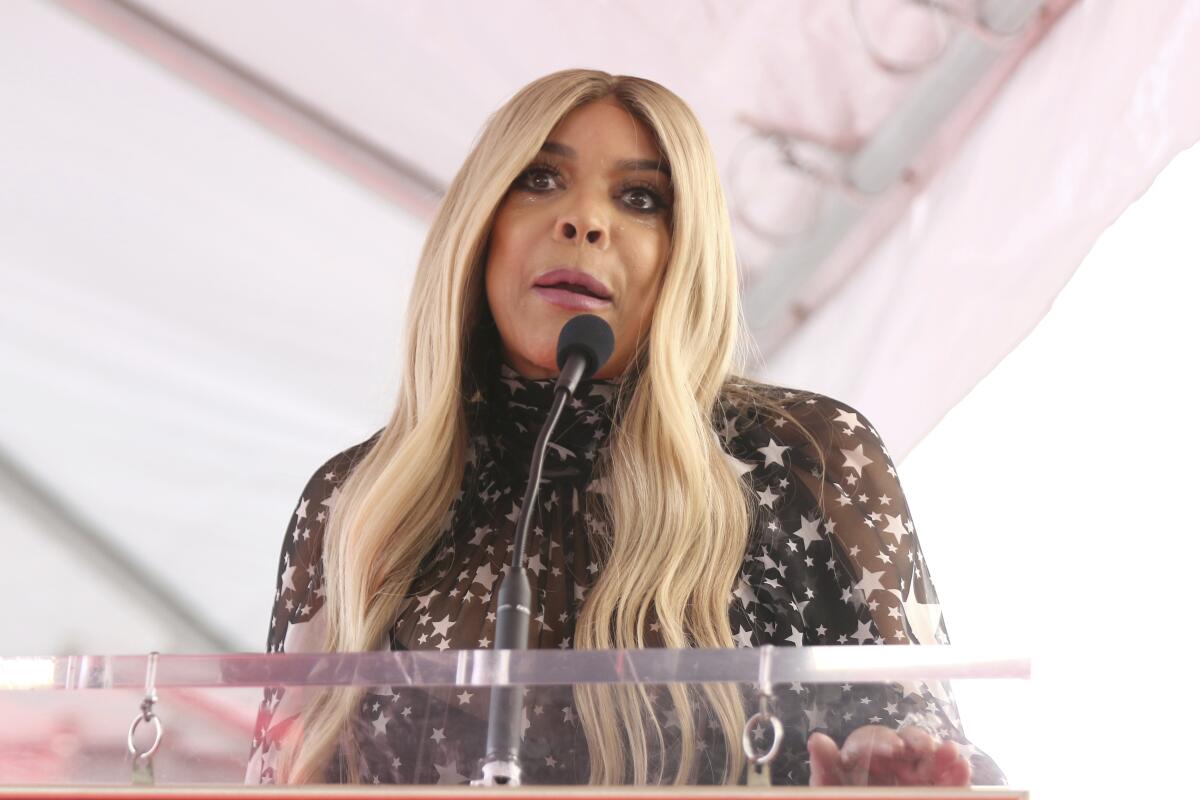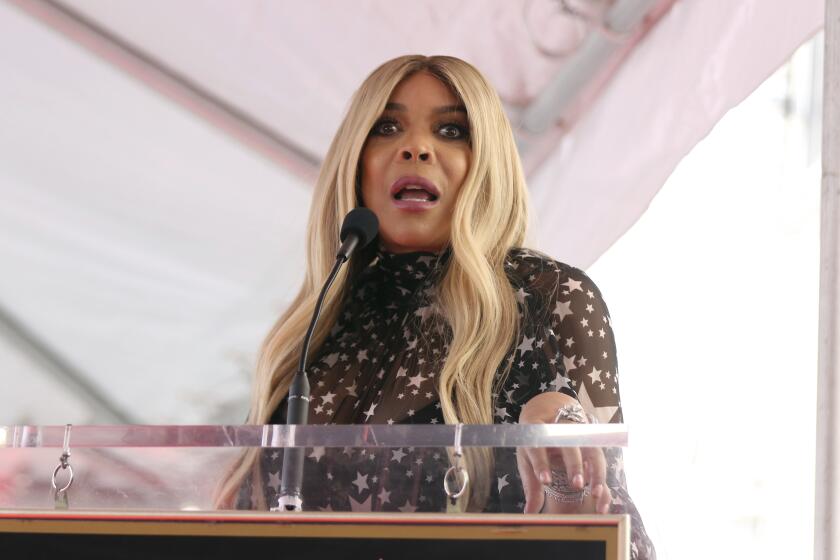‘Permanently incapacitated’ Wendy Williams couldn’t consent to Lifetime doc, guardian says

- Share via
When Lifetime released its contentious “Where Is Wendy Williams?” docuseries earlier this year, the cable channel credited Williams as an executive producer on the project.
But at the time of the documentary’s production, the former talk show host — who last year was diagnosed with early-onset dementia and aphasia — did not even “have the capacity to consent to being filmed,” her guardian Sabrina Morrissey said in a complaint filed in New York County Supreme Court.
“As is patently obvious from the very first few minutes of the Program itself,” Morrissey said in her September complaint, Williams “was highly vulnerable and clearly incapable of consenting to being filmed, much less humiliated and exploited.” Last month, the case was moved to federal court.
Wendy Williams has thoughts about Sean ‘Diddy’ Combs and the sex abuse and trafficking allegations that have eclipsed his career. He was arrested last month.
The complaint asks that the defendants pay Williams unspecified compensatory and punitive damages and asks the court to order the defendants to permanently stop airing the show.
The defendants in the case — Lifetime parent company A&E Television Networks, Lifetime Entertainment Services, EOne Productions, Creature Films and the doc’s executive producer Mark Ford — this month filed an identical counterclaim against Morrissey, calling her allegations “meritless” and denying that the documentary was filmed without a valid contract or without the guardian’s consent.
“This case arises from the misguided and unjustified efforts by Plaintiff to exceed the scope of her judicial authority over her ward [Williams], attempt to excuse her own failure to protect her ward, supplant [Williams’] wishes with her own, and deny [Williams] perhaps one of her last chances to exercise her autonomy and honestly reach her fans in exactly the frank and unfiltered manner that was the hallmark of her career,” the counterclaim reads.
The defendants also characterized “Where Is Wendy Williams?” as free speech protected under New York’s anti-Strategic Lawsuit Against Public Participation law. SLAPP suits like Morrissey’s, they argued, “chill free speech and the robust exchange of ideas and culture by targeting those who communicate about issues of public interest.”
The defendants also maintained that neither Williams nor Morrissey “attempted to stop production” on the documentary or moved to terminate the talent agreement — adding that Williams’ manager Will Selby and her family members watched the documentary before it aired and expressed support for its release.
The California Supreme Court on Thursday sided with consumers in a case alleging false advertising of a posthumous Michael Jackson album.
Presented in four episodes, “Where Is Wendy Williams?” was billed as a “raw and compelling documentary” that followed the media personality’s life after “The Wendy Williams Show” was canceled in February 2022. The cancellation came as Williams’ physical and mental health worsened. Filming on the doc began in August 2022, shortly after Williams was placed under financial guardianship, and stopped in April 2023 “due to her poor health,” according to court documents reviewed by The Times.
A month later, Morrissey said in her filing, Williams was diagnosed with frontotemporal lobe dementia and primary progressive aphasia — both debilitating neurodegenerative diseases that cause problems with behavior and language, per the National Institute on Aging — which have since left her “cognitively impaired and permanently incapacitated.”
In its counterclaim, A&E denied that it was aware of any dementia diagnosis “until near completion of the Documentary.”
After Williams’ diagnosis, Morrissey continued, she “reasonably assumed that the project was defunct, given that no contract was ever finalized and that [Williams] was obviously not working on a podcast or focusing on her career at that time.” The complaint said Williams may have signed an “on-camera talent agreement” after filming had already begun, but Morrissey called such an agreement invalid because of Williams’ incapacity — and because it was never shared with her guardian or the court.
“Completely shocked and horrified” when the documentary’s trailer dropped Feb. 2, Morrissey said she attempted to halt its release, but an appellate judge denied her restraining order request as impermissible prior restraint.
Nowhere in his ruling did the judge “address the merits of the Guardian’s assertion that [Williams] lacked capacity to consent,” Morrissey said in her recent filing, adding that despite their knowledge of Williams’ diagnoses, the defendants “shamelessly doubled down on their scheme to profit from the footage they had wrongfully captured.”
“They did so despite their full awareness that the Program depicted a severely disabled woman who was not in control of her behavior and who had lost the ability to make conscious and informed decisions throughout the Filming,” she said.
TV talk show host Wendy Williams issued a statement Friday thanking fans for their support after it was announced she was diagnosed with dementia.
Morrissey said in her filing that while Lifetime has “profited immensely” from the production, Williams herself was paid “a paltry $82,000.” In its counterclaim, A&E called that figure incorrect but did not provide a revised one.
Upon the documentary’s release in February, executive producer Mark Ford told The Times that the crew “never would have entered into the project if we knew that Wendy had dementia,” adding, “The project was signed off by her guardian, her attorneys or managers, her publicist, herself and then, ultimately, her family.”
“The deeper we got into it, honestly, it became more of a concern [about] what would happen to Wendy if we stopped filming than if we continued,” Ford said. “We also knew that we had the power to never air it. If this film couldn’t go in a redeeming or positive direction, then I guarantee you Lifetime never would have aired it, and we wouldn’t have been interested in airing it.”
More to Read
The complete guide to home viewing
Get Screen Gab for everything about the TV shows and streaming movies everyone’s talking about.
You may occasionally receive promotional content from the Los Angeles Times.










